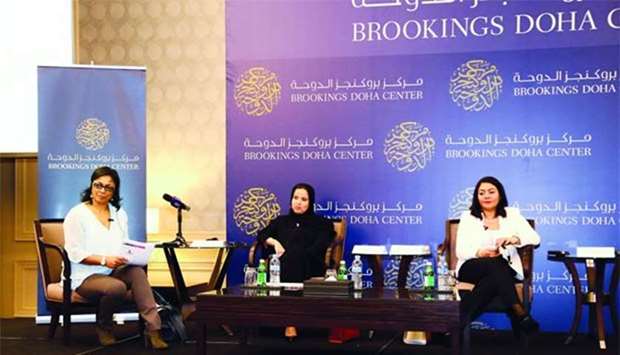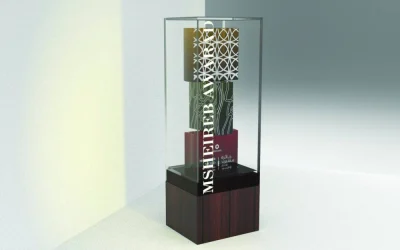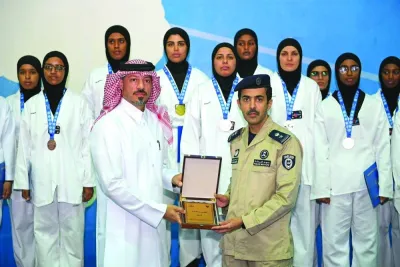A panel hosted by the Brookings Doha Centre (BDC) in honour of International Women’s Day to discuss the issues and challenges that women face in the Middle East, focused on forward-looking solutions to the general debates and problems.
Women in the Middle East face both setbacks and progress in terms of their social, economic and political inclusion and participation with their countries, it was pointed out at the event held on Wednesday.
While the marginalisation of women still exists, their powerful presence in the various protests around the region has garnered a mixed response.
The discussion included ways for women to talk about their suffering and problems without violent repercussions as well as the effectiveness of campaigns such as the #MeToo movement in properly addressing and giving platform to these issues, the BDC said in a statement.
The discussion also included the role of international organisations helping and better engaging women in the Middle East.
The panel consisted of Noor al-Malki al-Jehani, executive director at Doha International Family Institute; Shaimaa Aboelkhir, journalist at Al Araby TV; Maha Ghrer, project officer at The Day After; Beverley Milton-Edwards, visiting fellow at the BDC; and Maya El Ammar, Lebanese independent feminist activist and former spokesperson for KAFA. The event was moderated by Martine Dennis, news presenter at Al Jazeera English.
In her remarks, al-Jehani said: “The Arab Spring empowered women with the agency to voice their demands and exercise their rights.” She added that though many say women’s participation in the Arab Spring came with an expensive price tag, women were nonetheless central to the uprising.
Regarding the issue of persecution of activists for women’s rights, Aboelkhir said women in countries like Egypt were attacked in a systematic way. “Defending and speaking about human rights is a violation,” she said, adding that that women who do speak up face pressure and oppression for speaking up for their rights.
Ghrer discussed women’s experiences in Arab countries, stating that women receive harsher conditions in detention centres as opposed to men.
“Men who are captured in the strikes are seen as heroes, but their female counterparts are not. In fact, women who protest are often deserted by their own family members,” Ghrer said.
“Freedom is part and parcel of human rights and the feminist movement is not only about caring about the rights of the women, but about the rights of everyone.”
Milton-Edwards discussed gender disparity in the workforce and said, “The Middle East generally exhibits dismal rates of female employment, with the World Bank stating that just over 25% of women in the region are employed or actively looking for a job.”
Marginalising women in the economic and political sphere is holding back the growth of these countries, she added, even though women have played a vital role in shaping the voices and forces in the Arab world.
On the topic of men taking part in the campaign for women’s rights, El Ammar said it is important to recognise that women are not a minority and are equal to men. For this reason, she said, it is important for men to join in the movement as allies for equal rights for women.
El Ammar added that the ideas and stereotypes of toxic masculinity have to be revisited to change the overall cultural perception of gender.
While the marginalisation of women still exists, their powerful presence in the various protests around the region has garnered a mixed response.
The discussion included ways for women to talk about their suffering and problems without violent repercussions as well as the effectiveness of campaigns such as the #MeToo movement in properly addressing and giving platform to these issues, the BDC said in a statement.
The discussion also included the role of international organisations helping and better engaging women in the Middle East.
The panel consisted of Noor al-Malki al-Jehani, executive director at Doha International Family Institute; Shaimaa Aboelkhir, journalist at Al Araby TV; Maha Ghrer, project officer at The Day After; Beverley Milton-Edwards, visiting fellow at the BDC; and Maya El Ammar, Lebanese independent feminist activist and former spokesperson for KAFA. The event was moderated by Martine Dennis, news presenter at Al Jazeera English.
In her remarks, al-Jehani said: “The Arab Spring empowered women with the agency to voice their demands and exercise their rights.” She added that though many say women’s participation in the Arab Spring came with an expensive price tag, women were nonetheless central to the uprising.
Regarding the issue of persecution of activists for women’s rights, Aboelkhir said women in countries like Egypt were attacked in a systematic way. “Defending and speaking about human rights is a violation,” she said, adding that that women who do speak up face pressure and oppression for speaking up for their rights.
Ghrer discussed women’s experiences in Arab countries, stating that women receive harsher conditions in detention centres as opposed to men.
“Men who are captured in the strikes are seen as heroes, but their female counterparts are not. In fact, women who protest are often deserted by their own family members,” Ghrer said.
“Freedom is part and parcel of human rights and the feminist movement is not only about caring about the rights of the women, but about the rights of everyone.”
Milton-Edwards discussed gender disparity in the workforce and said, “The Middle East generally exhibits dismal rates of female employment, with the World Bank stating that just over 25% of women in the region are employed or actively looking for a job.”
Marginalising women in the economic and political sphere is holding back the growth of these countries, she added, even though women have played a vital role in shaping the voices and forces in the Arab world.
On the topic of men taking part in the campaign for women’s rights, El Ammar said it is important to recognise that women are not a minority and are equal to men. For this reason, she said, it is important for men to join in the movement as allies for equal rights for women.
El Ammar added that the ideas and stereotypes of toxic masculinity have to be revisited to change the overall cultural perception of gender.



